Corpus Christi Blog
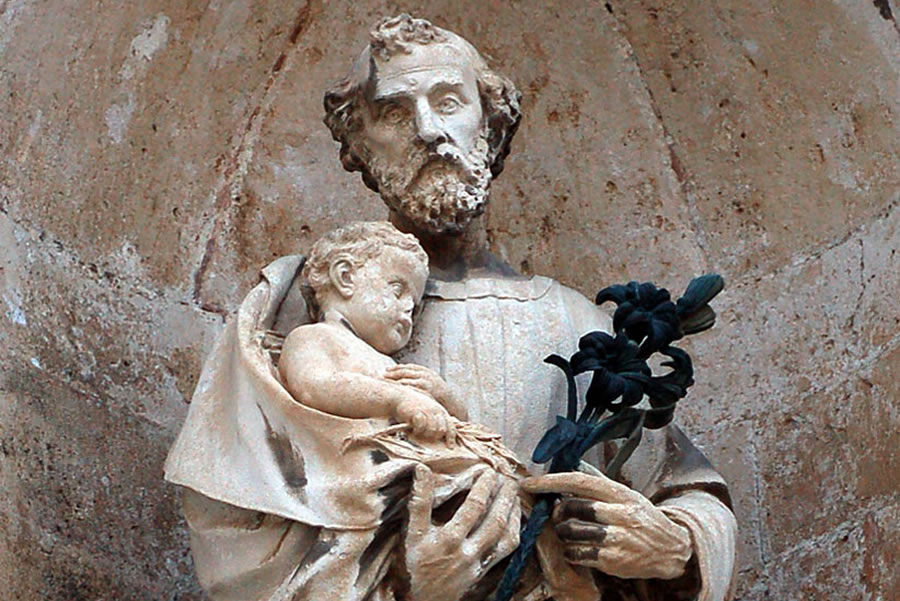
St. Joseph
06-17-2018Weekly ReflectionArchbishop Donald WuerlSt. Joseph: A Quiet Man with Much to Say
Excerpted from the June 2002 issue of Columbia, the monthly magazine of the Knights of Columbus.
Father's Day, in the United States especially, has become a day to recognize the important place of dad. While the celebration itself may be focused on a Father's Day card, a gift, or a special meal, at its heart is the recognition that a father plays a singularly important role in the life of a family. Children need a father. Fathers have a God-given responsibility to their children.
Recognizing this, Pope John Paul II took action, holding up St. Joseph as a model of modern manhood. On August 15, 1989, he issued an apostolic exhortation on St. Joseph and the Catholic understanding of fatherhood – Redemptoris Custos (Guardian of the Redeemer: On the Person and Mission of St. Joseph in the Life of Christ and the Church ).
READ MORE
Prescription for Failure
06-10-2018Weekly ReflectionDr. Clint LeonardContraceptives are supposed to make life easier. The idea is if married couples could have sex without the possibility of becoming pregnant that their marriages would be better, easier, and last longer. Couples would be happier. Unfortunately, it does not work that way.
Since 1960, when the introduction of the oral contraceptive pill accompanied and fueled the sexual revolution, there has been an explosion in the divorce rate. There is more sex before marriage, more cohabitation, and less commitment and actual marriages than ever. People are less satisfied and less happy. Why? Is there a link to the widespread use of the Pill? How about the use of long-acting contraceptives like the IUD or sterilizations – getting your tubes tied or having a vasectomy? Each of these interventions attempts to separate the possibility of new life arising from the act of intercourse, which ultimately separates the spouses from each other and from God. These broken relationships result in misery for the persons involved.
READ MORE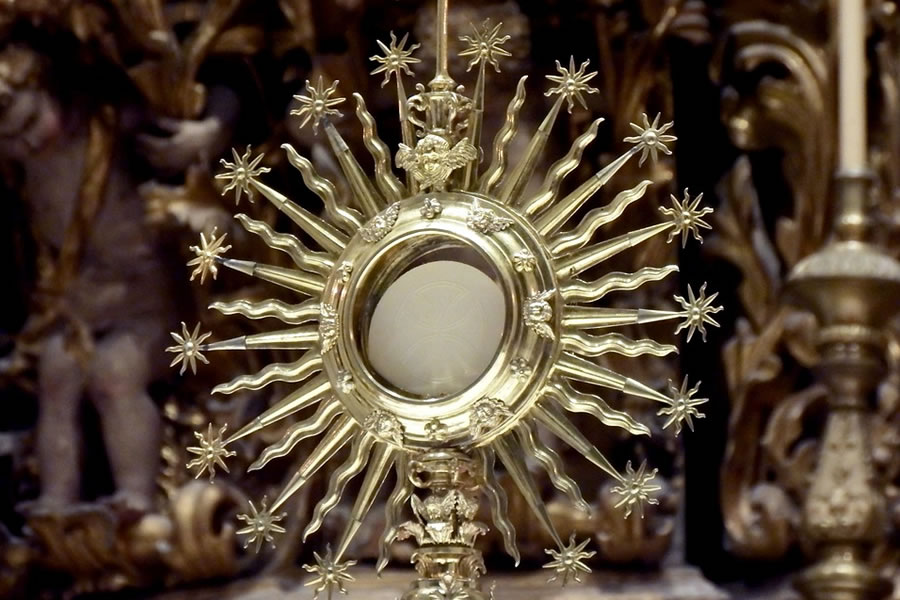
At the School of Mary, “Woman of the Eucharist”
06-03-2018Weekly ReflectionFrom Pope St. John Paul II’s encyclical, Ecclesia de Eucharistia
53. If we wish to rediscover in all its richness the profound relationship between the Church and the Eucharist, we cannot neglect Mary, Mother and model of the Church. In my Apostolic Letter Rosarium Virginis Mariae, I pointed to the Blessed Virgin Mary as our teacher in contemplating Christ's face, and among the mysteries of light I included the institution of the Eucharist. Mary can guide us towards this most holy sacrament, because she herself has a profound relationship with it.
READ MORE
Excerpts from “Not Just a Union but a Sacrament”
05-27-2018Weekly ReflectionShaun and Jessica McAfeeCatholic Answers Magazine; May-June 2018; www.catholic.com
Shaun: As an Evangelical Christian young adult, I took my faith seriously. Nothing mattered more than having a personal relationship with Jesus and committing myself to holiness. But my broader understanding of sin was problematic: I was a moral relativist. Something might have been a sin for me, but for others, it might have been licit.
Jessica: As a teenager, I had much to sort out about sex and all of the different points of view to which we were exposed. Contraception seemed to be more or less a personal preference, and it was rare to hear it even mentioned by a pastor or other authority. I had no clear teaching available to form my opinion on the matter except that, thankfully, my mother did teach me that some hormonal contraceptive methods could be abortive if they didn't actually prevent conception.
READ MORE
Pentecost was originally a celebration of the first fruits of the harvest
05-20-2018Weekly ReflectionFrom Pope St. John Paul II’s Catechesis on the Holy Spirit"1. From the foregoing catechesis on the article of the creeds on the Holy Spirit, one observes the rich biblical foundation of the pneumatological truth. At the same time, however, we must also note the difference of delineation, in divine revelation, of this truth in relation to the Christological truth. It is evident indeed from the sacred texts that the eternal Son, one in being with the Father, is the fullness of God's self-revelation in human history. In becoming "son of man," "born of woman" (cf. Gal 4:4), he was manifested and acted as true man. As such he also definitively revealed the Holy Spirit, announcing his coming and making known his relationship with the Father and the Son in the mission of salvation and therefore in the mystery of the Trinity. According to the announcement and promise of Jesus, the Church, the body of Christ (cf. 1 Cor 12:27) and sacrament of his presence "with us until the end of the world" (cf. Mt 28:20), has her beginning with the coming of the Paraclete.
READ MORE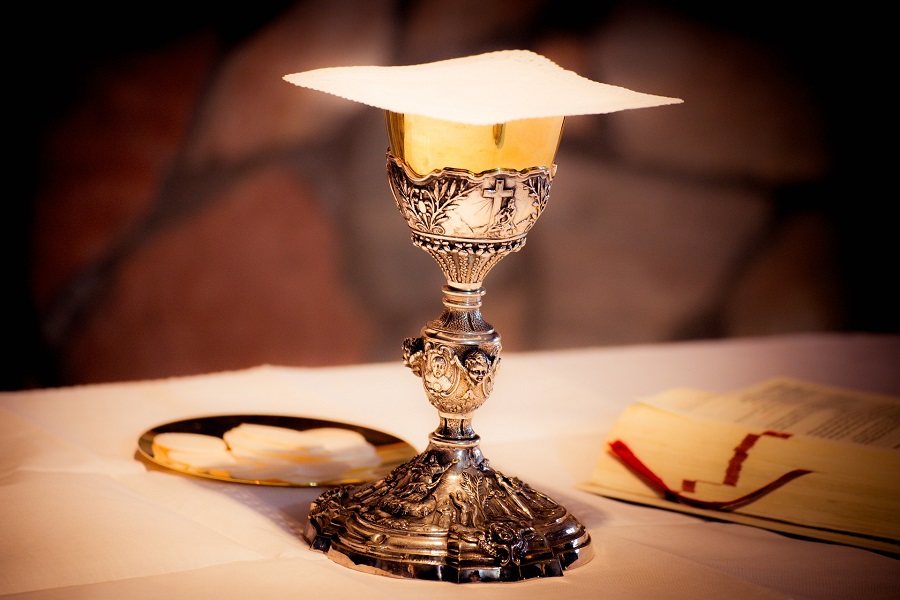
My Desire for Holy Communion
05-13-2018Weekly ReflectionParishioner Stephanie PickthallI was raised in a Catholic home and attended Mass regularly. I had received the usual sacrament as a child and attended a Catholic high school. As a teenager, I attended daily Mass for a while. I was feeling close to God. I was married in the Church at the age of 21. By the time I was 23, I had divorced and began living a sinful life. I went to church occasionally and stopped going to confession.
READ MORE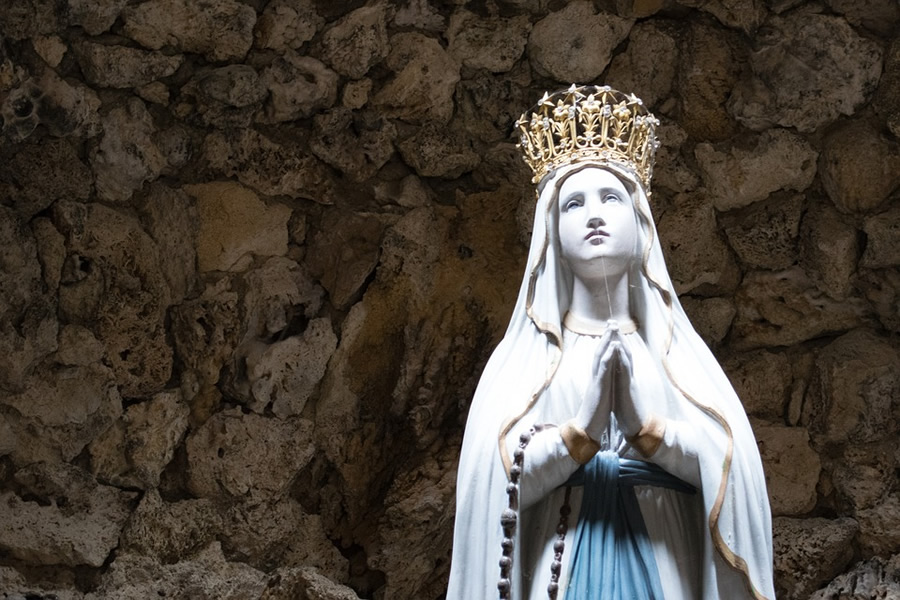
May is the Month of Mary
05-06-2018Weekly ReflectionMay the following quotes about our Blessed Mother help you grow in love and devotion to her aswe honor her throughout the month of May and prepare to consecrate our parish to Jesus through Maryon Thursday, May 31 with Mass at 6:30pm.
"Now, if the Councils, the Fathers, and even experience show us that the best means of remedying the irregularities of Christians is by making them call to mind the obligations of their Baptism, and persuading them to renew the vows they made then, is it not only right that we should do it in a perfect manner, by this devotion and consecration of ourselves to Our Lord through His holy Mother? I say "in a perfect manner," because in thus consecrating ourselves to Him, we make use of the most perfect of all means, namely, the Blessed Virgin."
― St. Louis de Montfort, True Devotion to Mary:With Preparation for Total Consecration
READ MORE
God’s Love and Mercy
04-29-2018Weekly ReflectionA testimony from an anonymous parishionerI have been praying about writing this for a few weeks now. It is a letter of praise and thanksgiving to our Lord Jesus for His love and mercy, as well as thankfulness for the witness Fr. Chad gave me of God's unlimited love for me.
Quite some time ago now, my husband had an affair. It was devastating. Not only did I have to mourn the loss of what I thought marriage was supposed to be, but my faith life went from a waterfall of grace to a trickling fountain that I could barely turn on. While my husband was deeply sorrowful and was finally seeking help for his issues, I felt completely broken. A lot of the thoughts I had when I was away from the Church came back with such a vengeance. The enemy knew how to attack me with fears, anxieties, and feelings of unworthiness to come before Jesus. I was afraid to go to Jesus, afraid of what might be in store for me if I kept striving for holiness, afraid of what my next cross would be.
READ MORE
Celebrating Our Parish Feast Day
04-22-2018Weekly ReflectionFr. Chad KingOur parish feast day is coming up – and this year, with double-blessings! As you may know, the Feast of Corpus Christi moves around a bit since it is liturgically celebrated on the Thursday after Trinity Sunday, which is the first Sunday after Pentecost (50 days after Easter)! This year, Corpus Christi falls on the same day as the Feast of the Visitation, which was when Mary visited Elizabeth following the Annunciation. How blessed we are to have so many opportunities to celebrate the events in the life of Our Lord and Blessed Mother!
READ MORE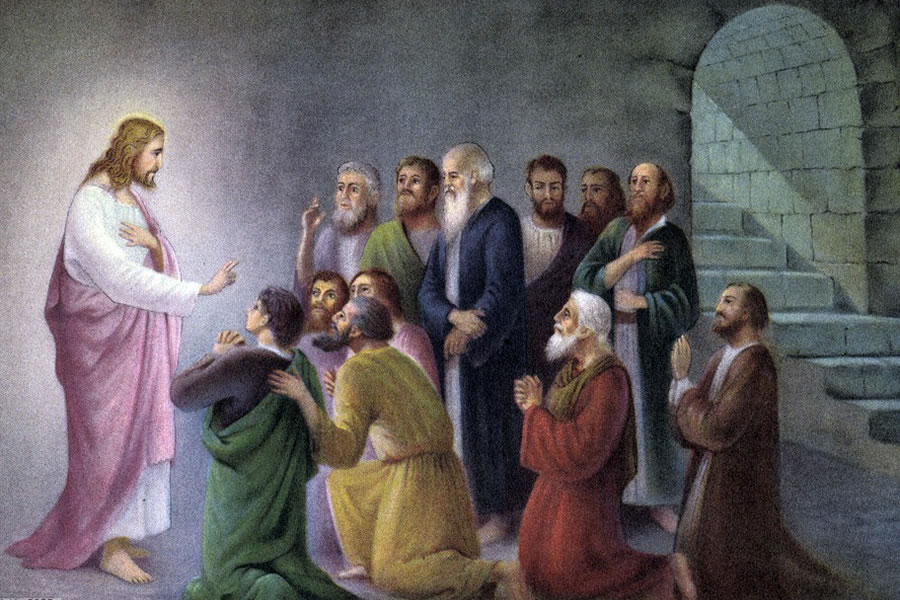
Lord of our Lives
04-15-2018Weekly ReflectionFr. Chad KingHappy Easter everyone! Christ is Risen!!!
For those of you who came to Mass here last week, you know that the Deacons preached. Thankfully, they each did a great job preaching on Divine Mercy and helped keep Fr. Rey and I busy in the Confessional by inspiring you (and I) to go to the Sacrament of Reconciliation regularly. I am sure Fr. Rey will attest also, that heartfelt and honest Confessions are one of the greatest joys of being a priest. Even though the Deacons preached, I was inspired by last Sunday’s readings, so I thought I would share my reflections with you here in the bulletin. (For those of you who might have been excited that I wasn’t preaching, sorry, even that can’t stop me!)
READ MORE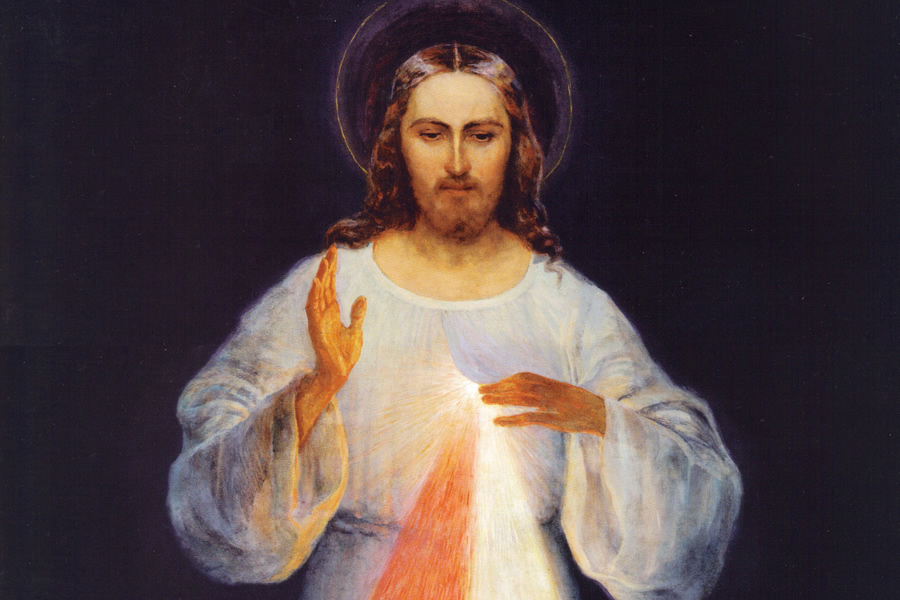
Divine Mercy
04-08-2018Weekly ReflectionIn May of 2000, Pope St. John Paul II canonized St. Faustina Kowalska and declared the Second Sunday of Easter as Divine Mercy Sunday. Here are a few quotes from St. Faustina's Diary pertaining to Christ's message of mercy.
Paint an image according to the pattern you see, with the signature: Jesus, I trust in You. I desire that this image be venerated, first in your chapel, and [then] throughout the world. I promise that the soul that will venerate this image will not perish. I also promise victory over [its] enemies already here on earth, especially at the hour of death. I Myself will defend it as My own glory. (Diary, no. 47-48)
READ MORE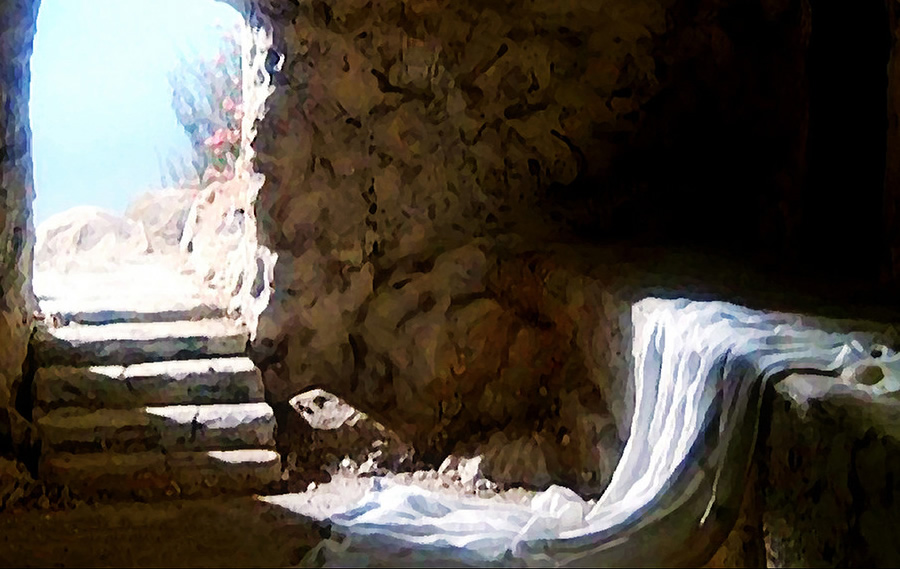
Excerpts from The Divine Romance: Dying and Behold We Live
04-01-2018Weekly ReflectionVenerable Archbishop Fulton SheenHaving delivered His farewell address from the pulpit of the Cross and finished the work of His Eternal Father, Jesus bows His head and dies. To make certain of His death, a centurion, Longinus by name, pierces His heart with a lance and the Divine Master, who saved up a few drops of His Precious Blood, now pours them out to prove that His love is stronger than death.
Two men who lacked courage to declare their affiliations while He was living, Joseph of Arimathea and Nicodemus, brought perfumes and spices and embalmed the body of Jesus. It was first laid on Mary's lap, and it seemed to her that Bethlehem had come back again — but really it had not. Between Bethlehem and Calvary our sins had intervened.The body was lifeless. Jesus was dead.
READ MORE